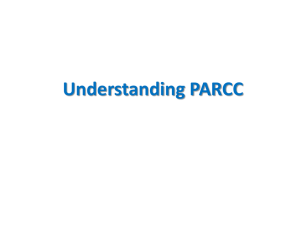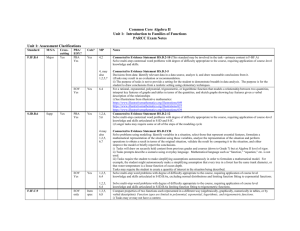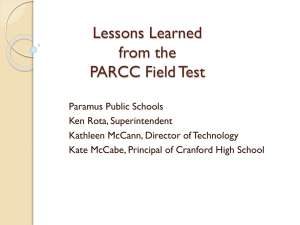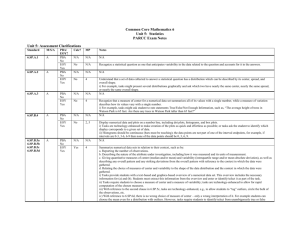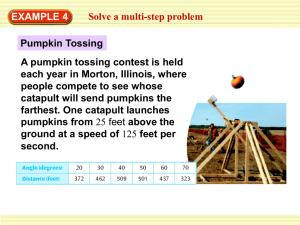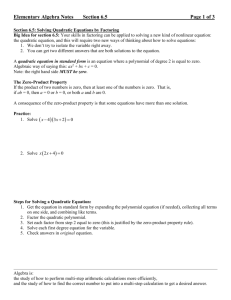04 CC Geom Unit 4 PARCC info
advertisement
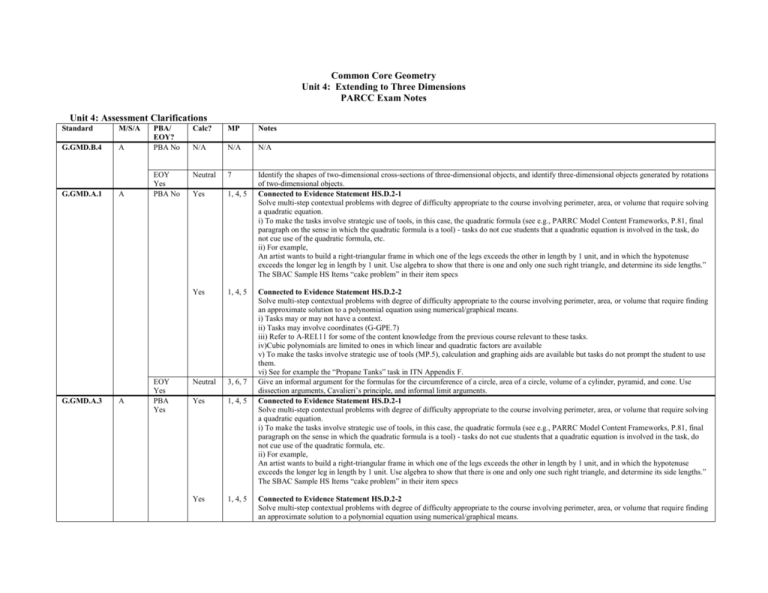
Common Core Geometry Unit 4: Extending to Three Dimensions PARCC Exam Notes Unit 4: Assessment Clarifications Standard M/S/A G.GMD.B.4 G.GMD.A.1 G.GMD.A.3 Calc? MP Notes A PBA/ EOY? PBA No N/A N/A N/A Neutral 7 A EOY Yes PBA No Yes 1, 4, 5 Identify the shapes of two-dimensional cross-sections of three-dimensional objects, and identify three-dimensional objects generated by rotations of two-dimensional objects. Connected to Evidence Statement HS.D.2-1 Solve multi-step contextual problems with degree of difficulty appropriate to the course involving perimeter, area, or volume that require solving a quadratic equation. i) To make the tasks involve strategic use of tools, in this case, the quadratic formula (see e.g., PARRC Model Content Frameworks, P.81, final paragraph on the sense in which the quadratic formula is a tool) - tasks do not cue students that a quadratic equation is involved in the task, do not cue use of the quadratic formula, etc. ii) For example, An artist wants to build a right-triangular frame in which one of the legs exceeds the other in length by 1 unit, and in which the hypotenuse exceeds the longer leg in length by 1 unit. Use algebra to show that there is one and only one such right triangle, and determine its side lengths.” The SBAC Sample HS Items “cake problem” in their item specs Yes 1, 4, 5 Neutral 3, 6, 7 Yes 1, 4, 5 Yes 1, 4, 5 A EOY Yes PBA Yes Connected to Evidence Statement HS.D.2-2 Solve multi-step contextual problems with degree of difficulty appropriate to the course involving perimeter, area, or volume that require finding an approximate solution to a polynomial equation using numerical/graphical means. i) Tasks may or may not have a context. ii) Tasks may involve coordinates (G-GPE.7) iii) Refer to A-REI.11 for some of the content knowledge from the previous course relevant to these tasks. iv)Cubic polynomials are limited to ones in which linear and quadratic factors are available v) To make the tasks involve strategic use of tools (MP.5), calculation and graphing aids are available but tasks do not prompt the student to use them. vi) See for example the “Propane Tanks” task in ITN Appendix F. Give an informal argument for the formulas for the circumference of a circle, area of a circle, volume of a cylinder, pyramid, and cone. Use dissection arguments, Cavalieri’s principle, and informal limit arguments. Connected to Evidence Statement HS.D.2-1 Solve multi-step contextual problems with degree of difficulty appropriate to the course involving perimeter, area, or volume that require solving a quadratic equation. i) To make the tasks involve strategic use of tools, in this case, the quadratic formula (see e.g., PARRC Model Content Frameworks, P.81, final paragraph on the sense in which the quadratic formula is a tool) - tasks do not cue students that a quadratic equation is involved in the task, do not cue use of the quadratic formula, etc. ii) For example, An artist wants to build a right-triangular frame in which one of the legs exceeds the other in length by 1 unit, and in which the hypotenuse exceeds the longer leg in length by 1 unit. Use algebra to show that there is one and only one such right triangle, and determine its side lengths.” The SBAC Sample HS Items “cake problem” in their item specs Connected to Evidence Statement HS.D.2-2 Solve multi-step contextual problems with degree of difficulty appropriate to the course involving perimeter, area, or volume that require finding an approximate solution to a polynomial equation using numerical/graphical means. G.MG.A.3 G.MG.A.1 Major Major EOY Yes PBA No Item Spec N/A 4 i) Tasks may or may not have a context. ii) Tasks may involve coordinates (G-GPE.7) iii) Refer to A-REI.11 for some of the content knowledge from the previous course relevant to these tasks. iv)Cubic polynomials are limited to ones in which linear and quadratic factors are available v) To make the tasks involve strategic use of tools (MP.5), calculation and graphing aids are available but tasks do not prompt the student to use them. vi) See for example the “Propane Tanks” task in ITN Appendix F. Use volume formulas for cylinders, pyramids, cones, and spheres to solve problems. N/A N/A EOY Yes Item Spec 1, 2, 5, 6, 4 PBA No EOY Yes N/A Item Spec N/A 1, 2, 5, 6, 4 Connected to Evidence Statement G-Int.1 Solve multi-step contextual word problems with degree of difficulty appropriate to the course, requiring application of course-level knowledge and skills articulated in G-MG and G-GPE.7. i) G-MG is the primary content ii) See examples at http://illustrativemathematics.org for G-MG. N/A Connected to Evidence Statement G-Int.1 Solve multi-step contextual word problems with degree of difficulty appropriate to the course, requiring application of course-level knowledge and skills articulated in G-MG and G-GPE.7. i) G-MG is the primary content ii) See examples at http://illustrativemathematics.org for G-MG. PBA/ EOY? PBA Yes EOY Yes PBA No EOY Yes (for Int) Calc? MP Notes Neutral 6 Neutral 6 N/A Item Spec N/A 1, 2, 5, 6, 4 Know precise definitions of angle, circle, perpendicular line, parallel line, and line segment, based on the undefined notions of point, line, distance along a line, and distance around a circular arc. Know precise definitions of angle, circle, perpendicular line, parallel line, and line segment, based on the undefined notions of point, line, distance along a line, and distance around a circular arc. N/A Connected to Evidence Statement G-Int.1 Solve multi-step contextual word problems with degree of difficulty appropriate to the course, requiring application of course-level knowledge and skills articulated in G-MG and G-GPE.7. i) G-MG is the primary content ii) See examples at http://illustrativemathematics.org for G-MG. N/A Connected to Evidence Statement G-Int.1 Solve multi-step contextual word problems with degree of difficulty appropriate to the course, requiring application of course-level knowledge and skills articulated in G-MG and G-GPE.7. i) G-MG is the primary content ii) See examples at http://illustrativemathematics.org for G-MG. N/A Connected to Evidence Statement G-Int.1 Solve multi-step contextual word problems with degree of difficulty appropriate to the course, requiring application of course-level knowledge and skills articulated in G-MG and G-GPE.7. i) G-MG is the primary content ii) See examples at http://illustrativemathematics.org for G-MG. Overarching Standards: Standard M/S/A G.CO.A.1 Supp G.MG.A.1 Major G.MG.A.2 Major PBA No EOY Yes (for Int) N/A Item Spec N/A 1, 2, 5, 6, 4 G.MG.A.3 Major PBA No EOY Yes (for Int) N/A Item Spec N/A 1, 2, 5, 6, 4 PARCC Abbreviation Key: PBA: Performance-Based Assessment EOY: End of Year Assessment M/S/A: Indicates whether this standard is considered Major, Supporting, or Additional Content MP: Standards for Mathematical Practice * Indicates a modeling standard PARCC Sub-Claims: Sub-Claim A: Information on how PARCC will assess major content Sub-Claim B: Information on how PARCC will assess additional and supporting content Sub-Claim C: Information on how PARCC will assess reasoning Sub-Claim D: Information on how PARCC will assess modeling
